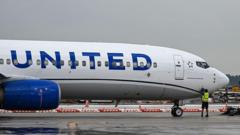In his debut as pontiff, Pope Leo XIV, the first American pope, emphasized his commitment to ordinary people and social justice issues. He called for concerted missionary efforts to address societal wounds, aligning himself with the teachings of his predecessor, Pope Francis.
Pope Leo XIV Advocates for the Ordinary in First Mass as Pontiff

Pope Leo XIV Advocates for the Ordinary in First Mass as Pontiff
The newly elected pope pledges to address the needs of the marginalized and prioritize missionary outreach during his inaugural homily.
---
Pope Leo XIV presided over his first Mass on May 9, marking a significant moment for the Roman Catholic Church, where he expressed a strong commitment to supporting “ordinary people” and addressing societal inequalities. The first American-born pope urged for increased missionary outreach to heal the “wounds that afflict our society," reinforcing the church's mission to serve the less fortunate.
Igniting the Mass with a relayed sense of urgency, Leo, who previously served as Cardinal Robert Prevost, referenced a disturbing trend of eroding faith that has led to "appalling violations of human dignity" around the globe. This inaugural ceremony came immediately following his unexpected election, which some cardinals remarked was influenced more by Leo's extensive service in Peru and his compassionate leadership than by his American heritage.
As he addressed the assembly of cardinals in the stunning Sistine Chapel, Leo sought to inspire action among church leaders. Drawing on the teachings of his predecessor, Pope Francis, he called for a united effort to tackle the pervasive issues facing communities and the Church today. His remarks included poignant observations on the modern perception of Christianity, which he characterized as being dismissed by contemporary elites as a belief held by the weak and uneducated.
As the 266th pope, Leo's personal narrative—shaped by over two decades of service in Peru—resonated with those attending his first Mass. He called for a Church that collaborates credibly and humbly with society, urging attendees to prioritize community engagement over institutional formalities.
Critics and supporters alike highlighted the need for this new direction, particularly in the vein of continued acceptance and support for migrants and the disenfranchised, marking a continuity with the efforts championed by Pope Francis.
In navigating a path forward, Pope Leo XIV's past as a leader in the Augustinian Order and his deep engagement in missionary work were underscored as essential elements shaping his perspective on the papacy. The transition marks not only the historical significance of having an American pope but also the potential for evolving Church doctrine on critical issues such as compassion for marginalized populations, secularism, and the role of faith in modern life.
As he follows in the footsteps of his predecessor, the Catholic community is left to ponder the practical implications of Leo XIV’s calls for a more missionary-focused Church poised to engage with the world's pressing challenges.
Pope Leo XIV presided over his first Mass on May 9, marking a significant moment for the Roman Catholic Church, where he expressed a strong commitment to supporting “ordinary people” and addressing societal inequalities. The first American-born pope urged for increased missionary outreach to heal the “wounds that afflict our society," reinforcing the church's mission to serve the less fortunate.
Igniting the Mass with a relayed sense of urgency, Leo, who previously served as Cardinal Robert Prevost, referenced a disturbing trend of eroding faith that has led to "appalling violations of human dignity" around the globe. This inaugural ceremony came immediately following his unexpected election, which some cardinals remarked was influenced more by Leo's extensive service in Peru and his compassionate leadership than by his American heritage.
As he addressed the assembly of cardinals in the stunning Sistine Chapel, Leo sought to inspire action among church leaders. Drawing on the teachings of his predecessor, Pope Francis, he called for a united effort to tackle the pervasive issues facing communities and the Church today. His remarks included poignant observations on the modern perception of Christianity, which he characterized as being dismissed by contemporary elites as a belief held by the weak and uneducated.
As the 266th pope, Leo's personal narrative—shaped by over two decades of service in Peru—resonated with those attending his first Mass. He called for a Church that collaborates credibly and humbly with society, urging attendees to prioritize community engagement over institutional formalities.
Critics and supporters alike highlighted the need for this new direction, particularly in the vein of continued acceptance and support for migrants and the disenfranchised, marking a continuity with the efforts championed by Pope Francis.
In navigating a path forward, Pope Leo XIV's past as a leader in the Augustinian Order and his deep engagement in missionary work were underscored as essential elements shaping his perspective on the papacy. The transition marks not only the historical significance of having an American pope but also the potential for evolving Church doctrine on critical issues such as compassion for marginalized populations, secularism, and the role of faith in modern life.
As he follows in the footsteps of his predecessor, the Catholic community is left to ponder the practical implications of Leo XIV’s calls for a more missionary-focused Church poised to engage with the world's pressing challenges.


















